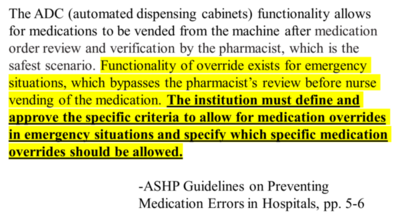
The ASHP (American Society of Health-System Pharmacists) has published guidelines directed to the prevention of medication errors in hospitals. These were generated in part in response to the seminal 1999 study by the Institute of Medicine, To Err is Human: Building a Safer Health System, which concluded that as many as 98,000 hospitalized patients died annually because of medical mistakes. Subsequent studies, including an authoritative 2016 study by Johns Hopkins University School of Medicine, have concluded the number of patient deaths to be as high as 250,000, or even as high as 440,000 patients annually. Even at the more conservative number, that makes medical mistakes the third leading cause of death in the United States.
These Guidelines are comprehensive and recognize the importance of compliance and adherence. In one specific aspect particularly relevant to the Mount Carmel Hospital overdose deaths, the Guidelines mandate scrutiny over any claimed “emergency” exemptions from drug-safety protocols. This is pertinent to the Mount Carmel cases, because the law firm of Leeseberg Tuttle has obtained information suggesting that Dr. Husel may have persuaded and intimidated hospital personnel, including nurses and pharmacists, in the drug administration chain, and thereby evaded drug safety protocols, by claiming “patient emergencies” required deviation from such safety protocols. This is what allegedly allowed Dr. Husel to order, pharmacists to fulfill, and nurses to administer lethal doses of fentanyl in violation of drug safety protocols. Verification of this information will be sought during formal discovery, including depositions of health care personnel at Mount Carmel Hospital who have been identified as being “involved” in the administration of the lethal doses.
The entire ASHP Guidelines on Preventing Medication Errors in Hospitals can be found here: preventing-medication-errors-hospitals.pdf
If you believe one of your loved ones was a victim of Dr. Husel or Mount Carmel, please contact us today to see if we can be of assistance.
